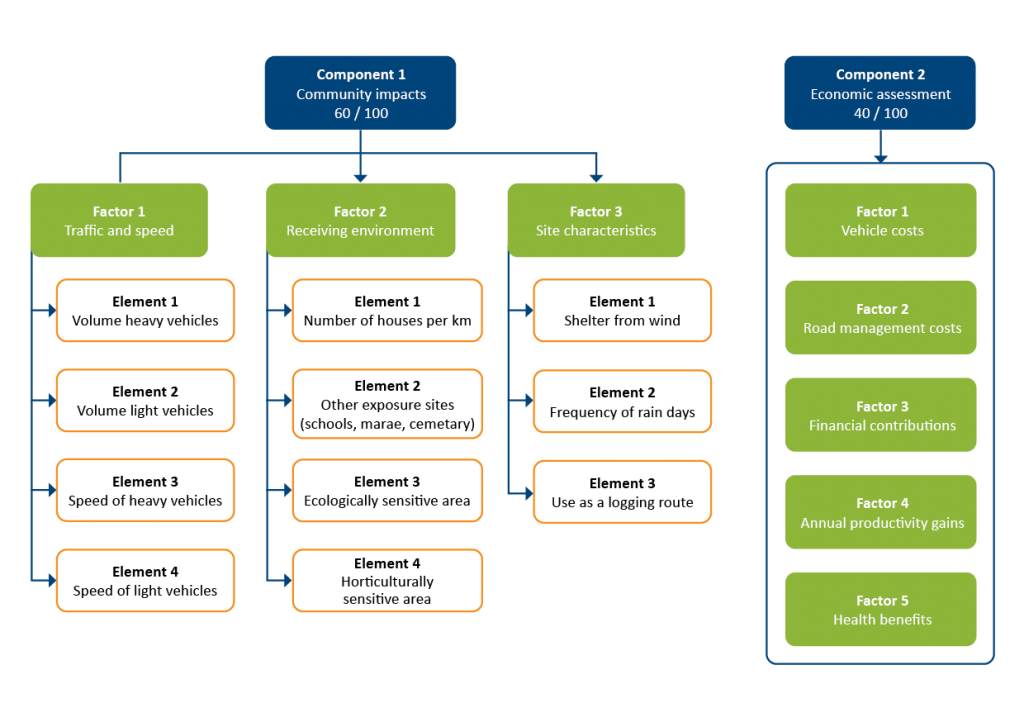Environmental impacts from unsealed roads, like dust, noise and vibration, have ongoing harmful effects on people and the environment.
We have set aside $750,000 annually through the 2021-31 Long-Term Plan to gradually seal gravel roads throughout the District.
As we cannot do every gravel road in one year, we have developed a Seal Extension Policy which will ensure those roads which need to be done are considered in an equitable and fair way.
To help us decide what roads need to be done and when, we use Waka Kotahi New Zealand Transport Agency guidance to prioritise roads based on community impacts like traffic and speed, how many houses are on the road and the surrounding environment. It also considers, to a lesser extent, economic benefits like completing two neighbouring roads and available budget in any year.
The most important aspect of both the community and economic impacts, relates to the health of people who live close to gravel roadways and who may suffer respiratory issues from regular dust exposure.
Roads with the highest score will be sealed before others.
Read the full Seal Extension Policy - (PDF, 700KB)
We are excited to get this work underway which will ensure our people can get around our District more safely and easily.
Seal Extension Priority List
Roads on this list have been scheduled to be sealed under the Seal Extension Policy in three-year blocks to align with Council’s Long-Term Planning. The roads are not in construction order as this will be decided year by year to ensure cost and construction efficiencies.
Some of these roads will not be sealed in full, or may be part sealed one year and finished the next, we will be updating this section of the website with maps soon to show the total sealing area. Please do not hesitate to get in touch to discuss a road of interest to you.
Please note this list may change should there be any unforeseen or emergency circumstances.
| 2021 - 2024 |
|---|
| Paekoa Road |
| Kawekawe Road |
| No 1 Road |
| Opurana Road |
| Thornton Hall Road |
| Hallett Road |
| Mangaone Road |
| Edgecumbe Soldiers Road |
| Rangi Road |
| Orini Road |
| Matiu Road |
| Matatā Causeway Road |
| 2024 - 2027 |
|---|
| Troutbeck Road |
| Leader Road |
| Matahī Valley Road |
| Te Whetu Road |
| Kope Drain Road |
| Kotorenui Road |
| 2027 - 2030 |
|---|
| Mottram Road |
| Matahī Valley Road |
| Symond Road |
| Taylor's Track |
| Settlement Road |
| Nuku Road |
| Jones Road |
| Paku Road (north) |
What roads qualify for sealing?
Some roads will qualify to be considered under the Seal Extension Policy and some will not.
Those that do qualify include:
- Ownership of road. Only roads that are owned or maintained by Council will be considered for seal extension works
- Sealing of Roads on Māori land. Māori Roads may be eligible if a formal application is received from iwi and legal provision is made for unrestricted present and future access to the road
- Legal status of the road. Only roads that have a legal status will be sealed. Any legal disputes will need to be settled before work starts. If this is too difficult the next highest scoring road section will be sealed instead.
Roads that will be excluded from prioritisation (but may still be sealed by other arrangements) include:
Roads that flood often. Sealing these roads will result in a significant increase in maintenance costs.
Special purpose roads. These are usually funded for sealing by other means
Community support. Where there is no local community support for sealing the road will not be sealed unless there is a significant maintenance or safety benefit in doing so.
Roads not servicing residential properties. Roads that do not service home, marae, schools / kura, or cemeteries / urupa will be excluded unless funding is available from Waka Kotahi.
How are the scores weighted?
Community exposure is worth 60% of a road's final score while the economic assessment is worth 40%.

Can I advocate for my road to be sealed first?
You can certainly let us know if you would like your road to be sealed, however this policy is designed to ensure all roads needing sealing are considered equally and fairly – it does not reward "squeaky wheels".
Will I need to find alternative routes?
Once we know what roads are being done and when we will ensure we communicate with those communities who will be impacted the most.
